Over the next few months, the Alliance of Independent Authors AskALLi team will be covering various aspects of audio for authors, today, we're giving you an overview of what the landscape and industry looks like as well as the strategies you might employ to produce and distribute your audiobooks. This is part one: the ultimate guide to self-publishing audiobooks.
 Our thanks to Megan Morreale from Soundwise for contributions to this post. You can find Soundwise here on their website or Facebook Page.
Our thanks to Megan Morreale from Soundwise for contributions to this post. You can find Soundwise here on their website or Facebook Page.
Self-Publishing Audiobooks: The Landscape
In the past, audiobook rights fell under the heading of “mechanical and reproduction rights” and audio was an unappealing investment for trade publishers and indie authors. Production, storage and shipping costs of creating tapes and CDs were high, and often books had to be abridged to fit within a tape or CD limit. The assumption was that only older people and the reading impaired were interested in audio and it almost seemed like publishers looked down on the level of clientele who purchased audiobooks. Some of these attitudes still prevail. According to The Bookseller, only 7% of books have a corresponding audiobook.
Here as elsewhere, self-publishing and new technologies are changing everything. Audiobooks are being listened to on a variety of devices by people of all ages and today, sales of audio books are growing faster than any other format. As digital downloads and subscription models have brought down production costs and retail prices, more people are listening to books while they drive, exercise or simply relax.
Technology like Kindle's Whispersync enables readers to switch between a-books and e-books without losing their place. New technology has also made the cost of producing an audio book manageable for indie authors because everything is managed digitally. Authors and narrators often work together on a royalty-splitting basis, lowering the upfront cost to the writer.
Today, audiobook authors have more opportunity today than ever before. The global audiobook market was valued at $2.67 billion in 2019 and is expected to expand at a compound annual growth rate of 24.4% between 2020 to 2027.
Nielsen Books and Consumer Survey and Audiobook Consumer Survey says growth in listening has grown exponentially. Podcasts and audiobooks are about 28% up in total and increase from 21% in 2017. Listening to these are growing, and taking small percentages of listening time from music listening and radio. Audiobook reading time accounts for 34% of reading time spent listening in 2020, 27% reading ebooks and 39% print books.
In fact, audiobooks are the fastest growing segment in publishing.
In the US alone, audiobook sales increased by 16%, generating over $1.2 billion dollars in revenue in 2019. To compare, e-books generated $983 million in revenue in 2019. That year was the first time ever that US audiobook sales eclipsed ebook sales.
But what's driving the growth?
Self-Publishing Audiobooks: is Self-Publishing is Right for Your Audiobook?
The most successful audiobooks have a few things in common: they’re delivering content that the market wants to receive in audio format, and the author has an established budget, audience, or marketing expertise so that promotion doesn’t start at square one.
What Type of Audiobook Content Sells?
Mysteries, thrillers and the suspense category have the biggest audiobook audience.
37% of survey respondents said they listened to audiobooks in these categories, up from 27% in 2018 and 31% in 2019. (Audio Publishers Association)
A deep dive into the Audible catalogue surfaced data that measured audiobook audience engagement based on the number of reviews in each genre. Sci-fi & fantasy audiobooks receive more engagement than any other genre.
Mysteries and thrillers are close behind. Here’s the final breakdown:
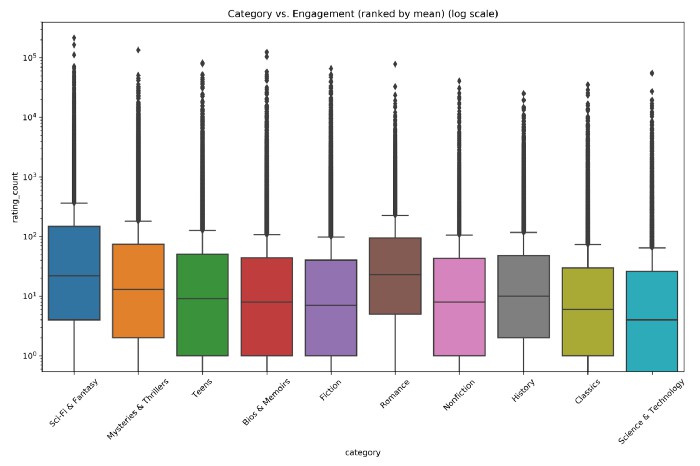
Shorter audiobooks also have a clear market.
43% of audiobook purchasers say they would buy an audiobook that is one to three hours long (Audio Publishers Association)
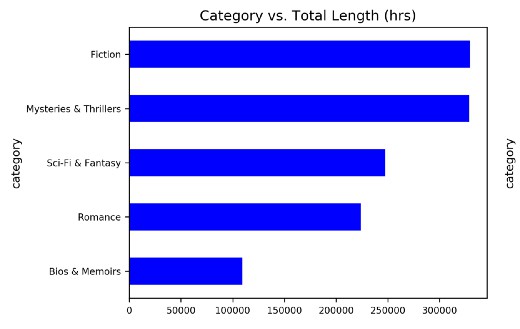
This may pose an opportunity for genres like romance, and bios & memoirs, which data shows tend to be shorter than other genres.
This is not to say that authors outside of these genres shouldn’t publish an audiobook. While authors in the sci-fi, mystery, thriller and romance genres do have established audiobook audiences on platforms like Audible, they also face more competition.
Audiences for other genres like nonfiction; history; science and technology; bios and memoirs; and history may be a bit smaller. However, those authors may have a much easier time reaching those audiences because their audiobooks are up against less competition.
For example, at Soundwise, we’ve anecdotally observed that our nonfiction authors in fact have more success with online advertising (e.g. through Facebook and Google) than fiction authors. There is less competition for those ads, and nonfiction audiences are more responsive to that type of marketing than fiction audiences.
How Much Does it Cost to Produce an Audiobook
If you plan to narrate, edit and publish your audiobook yourself, you can plan to only retain the cost of the recording equipment. This could cost between $150 and $500 depending on the specific products you purchase, although producing an audiobook on the lower end of this spectrum will be quite difficult.
If you’re working with a narrator or a production company, you should expect a cost of between $1,000 and $5,000 to produce an audiobook of 10 recorded hours. This includes equipment, narration and editing. This doesn’t include any potential marketing costs down the line, like advertising, which we’ll discuss later.
Where you ultimately fall within this range depends on your production strategy. You can:
- Record yourself at home. In this case, the only cost you’ll incur is the cost of recording equipment, which can include the following (we’ve included a links to popular options):
- Microphone: $50 – $150 (Blue Snowball, YETI)
- Pop filter: $15 (Dragonpad)
- Interface: $100 (Focusrite)
- Microphone stand: $30 (TONOR)
- Headphones: $70 (Audio-Technica)
- Recording software: $0 (Audacity, GarageBand)
- Record yourself in a studio. To do so, you’ll need to spend money to rent the space. The average price of a recording studio is 50-55$ an hour, but this will vary widely based on your location.
- Hire a narrator. If you’re paying a narrator, you should expect to pay between $100 and $400 per finished hour (PFH). As audiobooks are 10 hours on average, you can expect to pay $1,000 on the low end.
- Hire a production agency. An agency will handle narration and editing for you, but is the most costly option.
Here’s a breakdown of the cost you can expect for each of the four strategies above:
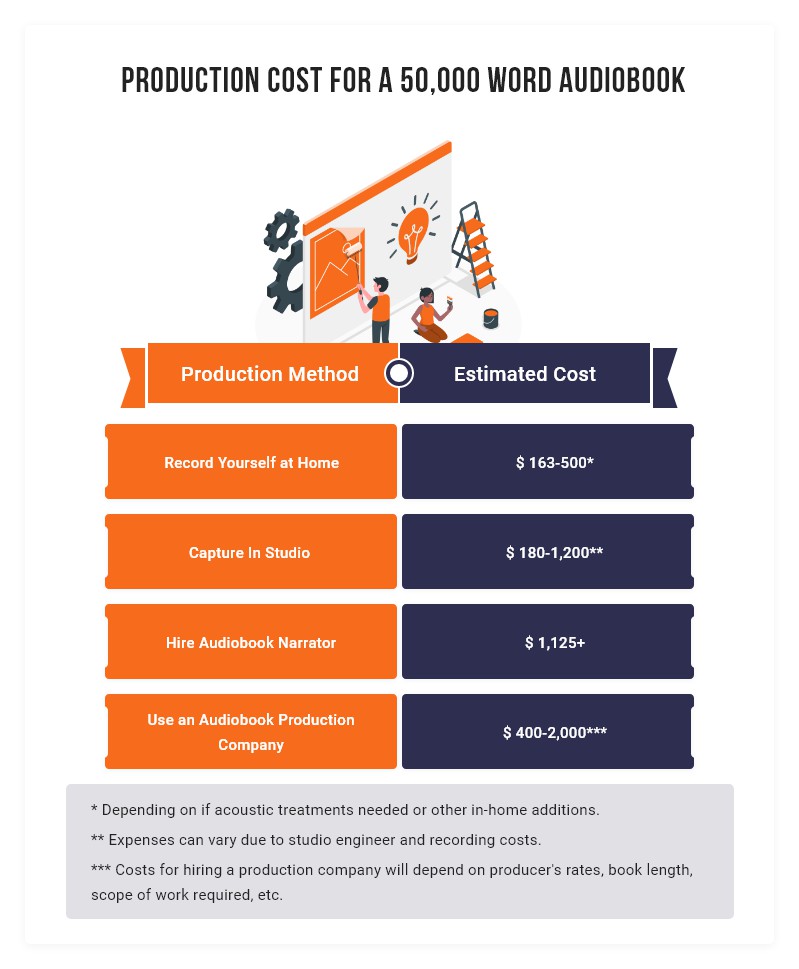
(Source)
Self-Publishing Audiobooks: Creating Audiobook Content
Once you’ve determined that self-publishing your audiobook is the right move for you, you’ll need to do a bit of work to prep your content for recording.
Write a Script
You’re likely either adapting a fiction or nonfiction book or ebook; or perhaps an online course or collection of blog articles to audiobook format. Maybe you’re creating something specifically built for audio. Either way, your scripted text should be written to be entirely comprehended in audio format.
Here are some things to look out for:
- Delete hyperlinks. Either choose to do without them or write in a reference to the sourced link.
- Delete captions and footnotes. Work them into the spoken text.
- Delete visuals. Replace them with descriptive text that paints the same picture for the reader. If relevant, point the reader to where they can see those visuals separately.
- If relevant, remove any calls to actions or click here prompts.
Once you’ve created your new script, read it out loud yourself to make sure it all makes sense in audio form.
Choose a Narrator
You can narrate your audiobook yourself, or you can have someone narrate for you. If you’re looking to work with a narrator, find talent on popular platforms like Findaway Voices, Bodalgo or Voice123. Before making your final choice, research their previous work and provide them one with to three sample pages to read as an audition.
Carefully consider the decision to narrate your audiobook yourself, if that’s what appeals to you most. Is your voice engaging for your audience, and do you have the voiceover skills to tell your story?
There’s a common consensus that having an non-preferred narrator is one of the biggest turn-offs for listeners. If you’re not working with someone who has the ability to capture an audience, it could impact sales.
If you are considering narrating on your own:
- Record a chapter with your phone or free recording app
- Listen with objective ears, imagining the experience you want for your listener.
- Determine whether you were drawn in to the story, or distracted by the narration. If the latter, think about cadence, pronunciation, accent, or perhaps a professional narrator.
- Get a friend’s opinion before pulling the trigger on self-recording.
Recording
If you’re working with a professional narrator or production company, you can skip this step. They’ll be handling this part on your behalf.
If you are recording yourself at home, these are some tips to execute during the recording stage so the editing process goes smoothly:
- Turn everything in the room off—fans, TVs, machines of any kind. If it hums even lightly, your mic could pick it up.
- Pick a carpeted room to reduce the echo.
- Stay still—specifically, don’t move closer and further from the mic as you speak. It will create an annoying fluctuation in volume that will make editing more challenging.
- Same goes for your voice, keep it at the same level.
- Don’t hold your breath. You’ll let it go all at one and have to edit it out.
- Read from a kindle, tablet or other electronic device. You don’t want to have to edit out page turning sounds.
- Schedule multiple recording sessions.
- Re-record if you make a mistake.
Editing
A production company will handle this step. If you’ve done a good job recording, the editing process will be easier. Here are a few tips to keep in mind when editing:
- Eliminate mouth sounds
- Eliminate harsh “s” noises
- Ensure the volume all falls within the same range
- Edit so that each chapter is it’s own file, with clear section headings
Create Other Assets
You’ll need more than just the recorded files to take your audiobook live. Package the following before you’re ready to publish:
- Sample audio track. It’s a good idea to have a sample track or two for people to listen to before they purchase.
- Book description. Prepare a couple of paragraphs to describe your book. Your description should be short, snappy and enticing—it’ll do a lot of the legwork when it comes to convincing listeners to ultimately buy.
- Cover art. Even if your audiobook doesn’t compliment a physical book, you need a cover image. Here are the specs from popular publishing platforms:
- Soundwise: Square image greater than 1400 x 1400 pixels and smaller than 3000 x 3000 pixels.
- Audible: 2400 x 2400 pixels or bigger with a 72 dpi resolution or higher, 24-bit (True Color) minimum and in RGB color (not CMYK).
Self-Publishing Audiobooks: Publishing Options for Your Audiobook
Once you’ve wrapped recording and editing, next up is making it accessible for download. In order to do that you’ll need to choose a publishing platform and determine the price of your audiobook.
ACX
Currently, the most popular digital platform for producing and distributing audio books is Amazon's ACX (Audio book Creation Exchange), which uses Audible as its distributor to Amazon and iTunes, the two biggest retailers of audio books.
However, there have been a number of issues come to light recently. You can read more about the issues here. But generally, Orna Ross, Director of the Alliance of Independent Authors has put the key issues very succinctly. Audible need to:
- “Cease the practice of clawing back payments from authors’ accounts when a return is received. This should never come from the author’s (already very low) percentage.
- “Make transparent the total number of purchases/returns on author payment dashboards (not net sales silently adjusted for returns).”
In working with ACX, the author must make two decisions,
First, the author must decide whether (i) to pay the producer an upfront fee for the work (typically between $100 and $1000 per finished hour) but no royalty paid to the producer for any sales, or (ii) to split the author’s share of audio book royalties 50/50 with the producer and pay no upfront fee.
The second decision is whether to sell the audio book through Audible on an exclusive or non-exclusive basis.
If the author grants exclusive rights to ACX, then the author receives 40% of the retail sales. However, the author must agree not to distribute the audio book through any other channels or in any other audio format, including the author’s own website. An exclusive agreement with ACX does not affect the author’s right to sell the p-book and ebook versions of the same work.
In light of the recent audiblegate campaign, ALLi urges authors not to be exclusive with ACX. If you choose the non-exclusive option, then the royalty rate is 25%. In this instance, you don't have the option to split royalties with the producer and must pay the producer a flat fee.
So, how do you drive a lot of sales with ACX? It’s complicated.
Audible is a winner takes all situation for authors—their algorithm prioritizes audiobooks that receive a lot of traffic and engagement. For established authors with large audiences, it’s great because the algorithm will pick up your audiobook early as loyal listeners make purchases, and then surface it to many new listeners.
If you don’t have a large audience, you can still hope to get picked up by the algorithm by driving traffic to your audiobook’s page on Amazon. In theory, if you generate enough traffic, the algorithms will amplify your audiobook as well. Exactly how long this will take or cost (if you’re running paid ads) is unknown, and has to do with factors in the algorithm that will likely change over time and are not in your control.
How does pricing work with ACX?
When it comes to pricing, ACX has full control. You’ll have strict distribution agreements and you won’t have direct access to your audience.
- Pricing. ACX sets the price for you based on length, as follows:
- Under 1 hour: under $7
- 1 – 3 hours: $7 – $10
- 3 – 5 hours: $10 – $20
- 5 – 10 hours: $15 – $25
- 10 – 20 hours: $20 – $30
- Over 20 hours: $25 – 35
We can make some estimates about what your audiobook would sell for by looking at some general statistics.
The mean price of all books sold on Audible is $15.43. Books in the mysteries & thrillers (average $20.53) and sci-fi & fantasy categories are priced higher, typically because they’re longer. Here’s the full breakdown:
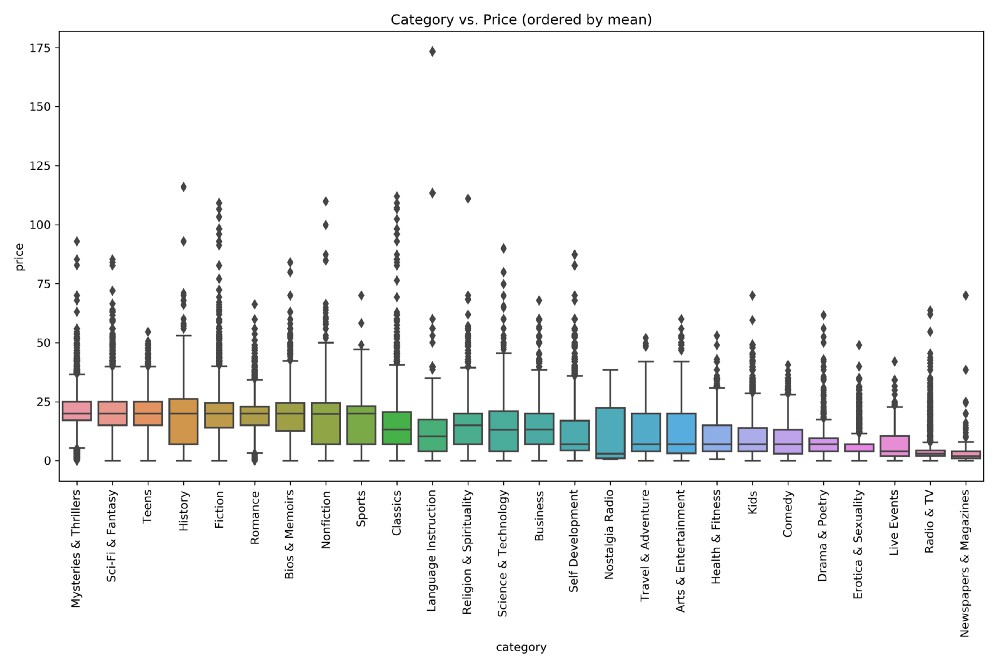
While your final price might deviate from the norm depending on length, popularity or another variable, it’s safe to assume this will be your starting point.
- Distribution agreements. If you exclusively publish with ACX, you retain 40% of the sales. If you’re publishing elsewhere as well, you’re only paid 25% of the sales.
- Access to your audience. Even if you were to get amplified by the Audible algorithm, you aren’t provided with access to your customer base. This means It’s hard for independent authors to build an email list to leverage for future sales.
Some authors do add a call to action in the book itself to sign up for an email list, but it’s nowhere near as effective as it would be to have access to every listener.
Still, Amazon offers the potential opportunity to be discovered by a new audience—after all, it’s Amazon, the biggest mall on the planet.
Kobo Writing Life
Since Sept. 2019, authors have the ability to upload their audiobooks directly through Kobo Writing Life, and sell them on Kobo.
Their audiobooks will be published in a few simple steps:
- Describe audiobook
- Upload cover image, audio files
- Create a custom Table of Contents
- Enter pricing and hit publish
- Audiobook will be published within 72 hours
No exclusivity is required. KWL usually encourages authors to publish and distribute with multiple platforms to broaden their audience. We also offer promotional opportunities for KWL authors. The roll-out is currently being beta tested and will be available to all accounts at a later time. Authors can publish audiobook in multiple languages, as they do with their ebooks. Authors interested by the audiobook functionality can email [email protected]
Here are a few useful links about audiobooks at Kobo:
- An episode of the KWL Podcast with Kobo’s Global Audiobok Merchandiser Elyse Daniels with great insight about the audiobook market, genres doing well, tips to price and market successfully audiobooks on KWL
- The audiobook section of KWL Help Center, with articles about the upload process, pricing, and FAQ.
Findaway Voices
Findaway Voices is another popular platform for production and distribution services. They offer packages to support audiobook authors from draft to publish, including narration, editing, marketing, distribution and sales.
They differ from ACX in a few key ways:
- They support narration and production. The average audiobook created with Findaway Voices has about 50,000 words and costs between $1,000 and $2,000, but it varies.
- They provide distribution to more marketplaces. They provide authors with access and distribution to more than 40 audiobook retailers and library platforms, including Audible, Apple, Google, Nook and many more.
Essentially, Findaway Voices acts as a pipeline between you and multiple distribution platforms. Just like with ACX, once your audiobook is listed on any one platform for sale, your reach is still at the whim of that platform’s algorithm.
How does pricing work with Findaway Voices?
You’ll have more control over the price of your audiobook depending on which distribution channels you choose.
For example, if you work with Findaway Voices to distribute your books on Amazon, you’ll still be locked into the pricing structure we mentioned earlier. With other retailers though, you’ll be able to set your list price.
- Pricing. Authors keep 80% of the royalties and pay a distribution fee of 20% of the royalties you earn.
- Distribution Agreements. They do not lock authors into exclusive contracts, and they assist authors with removing audiobooks from ACX exclusivity.
- Access to the audience. Findaway Voices is a middleman between you and the platform. They don’t provide a solution for authors to build an email list.
Findaway Voices is a good choice for established audiobook authors that are looking to get away from ACX exclusivity, but doesn’t solve the challenge of building a listener base directly for authors without a large audience.
Soundwise
Soundwise is the new solution for authors who want to sell audiobooks directly to listeners and build their own audience, without paying the high fees of the traditional platforms.
Soundwise differs from ACX in many key ways:
- You’re not up against an algorithm, or other authors. Soundwise is not a marketplace. Audiobook authors use Soundwise to host their audiobooks securely and deliver the audio to listeners’ mobile devices. Listeners buy audiobooks directly from the author.
- You can build an email list you own. Listeners are buying directly from you, and you own your email list. This is critical for any audiobook author’s long-term career—having an email list allows you to stay in touch with and sell directly to former customers as you produce more books and audiobooks. An expanding reader/listener email list is arguably the most important asset of any indie author.
- You can fully track and measure your marketing strategies. You’ll be able to optimize your marketing strategy and sales funnels, which will also be critical for future audiobook sales.
- The platform is easy to use. You could be ready for sales within the hour. Audio hosting, payment, promo codes, analytics, mobile and web content delivery are all in one place.
- You can build a community, through direct contact with your audience. Listeners can leave comments and you have the option to reply.
- It’s secure. Though listeners can listen offline, they won’t be able to move or copy your files.
How does pricing work with Soundwise?
You have full control over your pricing with Soundwise and have the potential to keep 100% of your profits, while Audible will take 60% to 80% of your sales.
- Pricing. With Soundwise’s starter plan ($10 a month if you sign up annually), you retain 90% of each transaction. You keep 100% of your audiobook sales under the Plus, Pro and Platinum plans.
This means, profit wise, five Soundwise sales are equal to 25 Audible sales. This means in most cases, the ROI of your marketing spend will always be higher (unless you’re lucky enough to really be favored by Audible’s algorithm).
Here are some pricing stats of audio products sold through Soundwise:
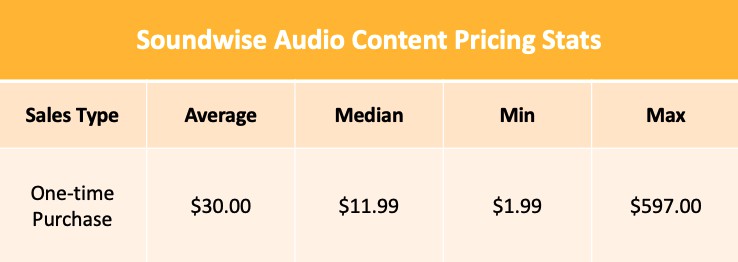
It stands out here that the average price is three times that of the median price. Authors on Soundwise have more pricing flexibility. They simply increase their price if they choose, but more often they experiment with things like book bundles and personalized content, which are the types of audiobooks that fall on the high end of the spectrum. In addition, authors can experiment with higher prices more easily because they aren’t in competition with one another.
- Flexibility. With full control over your pricing structure, you can be more flexible and test strategies like price promotions, bundles sales, limited time discounts, exchanging audiobooks for listener reviews, and more.
- Distribution agreements. There are none, you’re fully in control.
Since all plans cover unlimited audio upload, you can make Soundwise the homebase to sell your entire audiobook catalog direct-to-listeners. If you are prolific like Demelza Carlton, an author of over 50 books, you can even bundle all your audiobooks together for sale as a higher-priced item.
Other authors, like NYT bestselling author Lauren Blakely, use Soundwise to send advanced listener copies privately to her review group.






Self-Publishing Audiobooks: How to Choose the Right Platform for You
Should you sell through a large platform like Audible or sell to your listeners using a tool like Soundwise? At Soundwise, we think the answer to the question is not either-or, but both. Whether you’re just starting out as an audiobook author or you already have a large audience, marketplace platforms like Audible can potentially provide you with access to new listeners, and therefore they shouldn’t be ignored. (NOTE: ALLi recently downgraded ACX/Audible's rating to caution due to mishandling of author payments on the platform, and continued lack of transparency, accountability or recompense. Many authors are currently choosing not to use the Amazon platform, despite it having the largest cohort of listeners).
ALLi sees firsthand, each day, how exclusivity is a dangerous for authors and whether you choose to use ACX or not, you should also prioritize building your own audience and email list. Whatever platforms you use, you need to experiment with different marketing strategies to optimize for future sales, and figure out what your sales funnel should be.
A direct-to-consumer platform like Soundwise is a great tool for accomplishing those goals.
If you want to take advantage of both large marketplaces and direct-to-listener sales, here are some ideas to get your started:
- Create shorter, free audiobooks to distribute via Soundwise to build your email list, while still publishing full-length audiobooks on all platforms.
- If you have multiple audiobooks or a series, publish individual audiobooks through ACX or Findaway Voices, but include a call-to-action in the audio content itself that directs listeners to a full catalogue of audiobooks on your website, bundled at a discount. Use Soundwise to host and deliver that bundle.
- Use Soundwise to distribute free advance listener copies of new audiobooks in return for reviews. That way, you’ll collect an abundance of stellar testimonials to use when you do a full launch.
- Use ACX to sell individual audiobooks, but use Soundwise to sell your audiobook plus an “add-on” at a higher price, like audiobooks with additional content, audio-and-print bundles, extra chapters, blooper reel tracks, and more.
- Use Soundwise to experiment with marketing strategies to optimize your funnel for future sales. You’ll have full access to analytics for every campaign to test.
Self-Publishing Audiobooks: Audiobook Promotion & Marketing
While self-published authors are responsible for their own marketing and promotion, the good news is that you have full control over finding and selling to your listeners. The even greater news is that once you have that audience, you can nurture them and retain them as future customers.
These are some core strategies to focus on when just starting out:
Pitching Podcasts, Booktube and Book Round-ups
Find podcasts, booktubers and online publications where your audience is likely already engaged or subscribed, and pitch yourself or your audiobook to be featured in an upcoming podcast episode, article or video.
You should prioritize marketing to podcast audiences because you already know they like audio content! There are two types of book podcasts to target: those that cover all types of books, and those that specifically broadcast audiobook content.
These are the ones that specifically broadcast audio content
These podcasts cover and review books and the publishing world as a whole:
Here are some popular sites to reach out to:
The literary YouTube space has been dubbed ‘Booktube.’ These Booktube channels have massive followings, and often interview authors and record book reviews:
You could do the research involved with finding and pitching relevant journalists, podcasters and YouTubers yourself. You could also pay a public relations (PR) agency with a track record in audiobook promotion. They’ll likely have connections that will help when it comes to getting your audiobook covered. Or, work with a paid platform like Edelweiss+ or NetGalley to distribute your book to journalists for review.
Interacting on Facebook Groups
You should be active on social media so as to give your listeners another way to interact with you directly.
When you’re still trying to build your audience, be active in Facebook groups for audiobook listeners to attract new fans. Here are some popular ones:
Use These Sites to Get Features or Reviewed For Free
There are sites that exist specifically to help audiobook authors find new listeners, to which you can apply to be featured or reviewed for free. Here are some of them:
- Audiofile magazine
- Library Journal (greatly influences library sales)
- Audiobookjukebox.com
- Audiobooksunleashed.com
- Audiofreebies.com
- Audiobookboom.com
Submitting for Awards
While the act of receiving an award doesn’t automatically get you in front of a ton of new customers, having an award badge on your site or social media channels can help assure listeners that your audiobook is worth a try if you’re a new author.
Consider submitting your work for one of the following popular audiobook awards:
There are of course many other marketing strategies to consider, including the launch and development of individual social media channels, influencer marketing, online advertising, email marketing and more, but these are unique to audiobook promotion and should be considered as a core part of your marketing strategy alongside other methods.
Discount Sites
There are also discount sites where you can discount your audiobooks and send the deal out to thousands of eager listeners. Bookbub has one such site called Chirp books that you can use.
Send Advance Copies Direct via Bookfunnel
You also have the ability to send out advanced copies to encourage reviews and for your street team using Bookfunnel's new audio service. You can also use this service to sell books direct to listeners on your website. Find out more here.
Self-Publishing Audiobooks: That’s It, You’re Ready for Launch
When you self-publish an audiobook, you’re in the driver’s seat, and to get from zero to sixty, you should keep in mind some of these following takeaways:
- Self-publish if it’s the right strategy for you. You should be excited for the hustle that comes with marketing your audiobook, and have audio content that’s set up for success.
- Create content listeners want. Choose a good narrator and develop high-quality recordings, whether that’s on your own or with a third-party.
- Reap the benefits you deserve. Choose platforms that work best for your needs. If you’re an established audiobook author with a large audience, and you know you’ll automatically get picked up by platform algorithms, ACX or Findaway Voices are good places to start. If you have a smaller audience and/or want to take full charge of your audiobook’s marketing and sales, selling directly to listeners may be the way to go. And authors with audiences of all sizes cannot afford to ignore building their email list and directly connecting with their listeners. Soundwise is an ideal tool for these purposes.
- Marketing. Meet your listeners in spaces where they already exist online for the best results upfront.
Your listeners are out there—reaching them is just a matter of having the right creation and distribution for your audiobook.
Self-Publishing Audiobooks: Member Case Studies

Joanna Penn, ALLi's Enterprise Advisor, shares her distribution strategy
First up, we hear from ALLi advisor and authorpreneur Joanna Penn. Joanna is also the author of Audio for Authors: Audiobooks, Podcasting and Voice Technologies
What strategy do you use to sell audiobooks?
I still have a few audiobooks that are exclusive to ACX because they are royalty split deals, but for the last few years, I've been publishing all my audiobooks wide through FindawayVoices.com as well as ACX and also selling direct.
FindawayVoices gets my audiobooks into 42 retailers, including the subscription services like Scribd and Storytel, marketing platforms like Chirp by BookBub, and library services. I also sell audiobooks directly through Payhip.com integrated with Bookfunnel for audio which is proving to be a fantastic stream of income. I love wide publishing because I can reach readers all over the world on multiple platforms and make higher profit margins by selling direct.
What is the best advice / tip you can give indies wanting to sell more audiobooks?
To reach audio-first listeners, you need to do audio-first marketing. Pitch for podcast interviews in your niche. Put your samples on Soundcloud, YouTube, Facebook, and other platforms where people find audio. Use audio marketing services like Chirp and AudioBookBoom.
More tips here.
How do you produce your audiobooks and do you have any quick tips to help Indies produce their audiobooks?
I use professional narrators through FindawayVoices.com for fiction. For non-fiction, I narrate my own books in my home voice booth, edit in Amadeus Pro, and I use Auphonic for mastering the files, although I have also outsourced mastering in the past.
Joanna Penn, author of Audio for Authors: Audiobooks, Podcasting and Voice Technologies
***
Next, we hear from USA Today bestselling author, Sara Rosett. Find out more about Sara on her website and instagram.

Sara Rosett author
What strategy do you use to sell audiobooks?
I'm wide with my audio because I'm wide with everything. It gives me more options. I can put the audiobooks on sale, bundle them, and sell them directly to my readers. I use Findaway for distribution to all platforms except Kobo. I upload directly at Kobo to take advantage of their promotions. With my latest release, I added direct sales through Bookfunnel and Payhip. With ACX being so slow to approve audio, I discovered that delay is a window of opportunity to sell directly to my readers. It's been so successful that I plan to sell audio bundles exclusively through direct sales.
What is the best advice / tip you can give indies wanting to sell more audiobooks?
The narrator is probably the most critical choice. If you find a narrator who has a following in your genre, it can really give your books a boost.
How do you produce your audiobooks and do you have any quick tips to help Indies produce their audiobooks?
I have my virtual assistant do the audio proof for me. It's such a timesaver! My virtual assistant creates a spreadsheet and notes the timestamp of any discrepancies between the audio and the book. The narrator also has access to the spreadsheet. She fixes any problems, and then my assistant checks the audio to make sure all is good. It saves a lot of emailing back-and-forth and frees up time for me to write. I also plan on a long lead-time for all my books so that I'll have the ability to get the audio finished before the release date.
***
Next up we hear from Mark Hayden who tells us about his audiobook marketing. Find out more about Mark on his Facebook and Website.

A bit of background to start. My main series is Urban fantasy. There are also 5 previous novels from a “related universe” but I don’t promote them. My books are eBook exclusive to Amazon (with print wide). My royalties are 52% KU, 44% eBook and 4% paperback.
I waited to procure my first audiobook until I was busy writing Book 7 of the main series. Audiobooks had always been part of my long-term plan, but I knew that I wanted them done properly, and that would mean a big investment. I didn’t want to make that investment until I knew the series was going to be successful.
I chose Audiofactory to do the recording. They are a well-established name and offered me a roster of voice actors to audition from. They were professional, they made every effort to get going during 1st Lockdown and the quality of production is first rate. They are not cheap (£245+VAT Per Finished Hour).
When I started this series, I deliberately made Book 1 relatively short (80k words) and Book 2 slightly longer (120k). I also tied the stories so closely together that they made a seamless whole. I released both eBooks together and did the same with the audiobooks. Took a lot longer (and was double the investment!!!) but worth it to get people thoroughly hooked into the series, especially as there is going to be a gap between audiobooks 2 & 3+.
I went for non-exclusive with Audible and everywhere else with Findaway voices, based on advice from Audiofactory and ALLi. I think this may have been a mistake (see below). I found it’s been relatively easy to promote the Audible books through Facebook. I get reasonably good feedback from the advert. I’m not investing much, though, around £5 per day. It’s annoying that you can’t advertise through Audible though! Since launch, they’ve sold well enough for me to commission the next books.
For me personally, marketing to the Findaway distributors is a nightmare. Everyone seems to rate Chirp and promotions. I am very reluctant to spend time on that, though I will give it a go. If I’d opted for exclusivity to Audible, I’d be making a lot more money for the same effort. When I floated this in the ALLi group, I got shot down because there was a lot of anger about Audible. Regardless of Audible’s faults, if you are KU exclusive and well established, I would strongly recommend Audible Exclusive because Amazon will do so much of the heavy lifting for you. AND when your own marketing all points to Amazon, you get side benefit.
It could be years before audio turns a profit on a multi-£k investment, but it will grow with your series brand. My mailing list is not huge by some standards, but they’re pretty loyal. I got some early sales and reviews from them which helped establish the audiobooks. It still amazes me that I have some readers who have read the eBooks, bought the paperbacks and then gone on to audio!
Why did I choose this particular route? You could call it vanity. I have always wanted my books to look and read to a high standard (I also invested in a good cover designer early on and built a relationship with her). I waited until I knew my books were established and then went to a decent producer.
 Our thanks to Megan Morreale from Soundwise for contributing to this post. Megan's expertise is data storytelling and thought leadership for companies in the technology, content, marketing, advertising, sustainability, security, healthcare, CRM, HR tech and finance spaces. She regularly contributes to sites like Content Marketing Institute, SEMRush, Vox Media, and others. Find out more about Soundwise on their website or Facebook.
Our thanks to Megan Morreale from Soundwise for contributing to this post. Megan's expertise is data storytelling and thought leadership for companies in the technology, content, marketing, advertising, sustainability, security, healthcare, CRM, HR tech and finance spaces. She regularly contributes to sites like Content Marketing Institute, SEMRush, Vox Media, and others. Find out more about Soundwise on their website or Facebook.

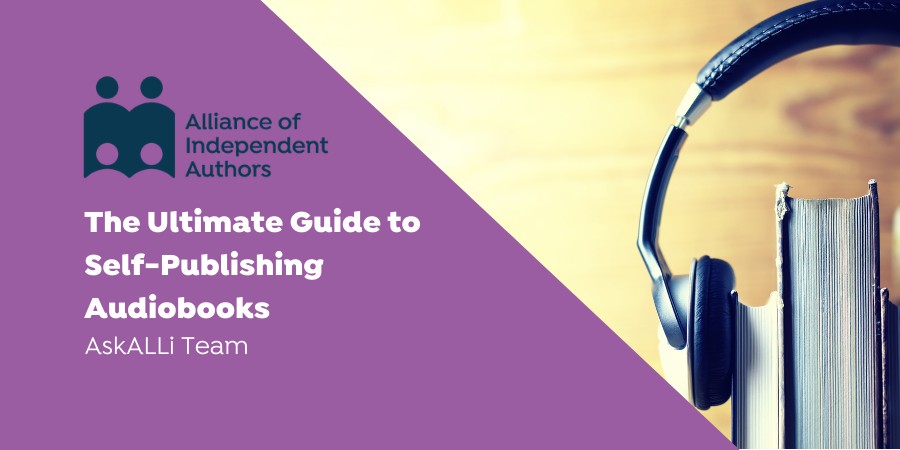



Any comments on Scribl, that used to be Podiobooks? Just ran across it and can’t find much info beyond their website. Thanks
First, this article has been invaluable since it was written.
Second, with the changes to the audiobook market landscape within the past 12 months, expressly Findaway being devoured by Spotify, this article is an opportunity for an amazing update. This industry is all gas no brakes right now.
67sjl6
I’ve been publishing and producing audiobooks for over ten years now, and I just want to say that it is bad advise to tell self-published authors that they just need to buy some cheap equipment and record their books themselves. Yes, you can produce your audiobook at home, but too often we have had self-published authors come to us for audio mastering of their 10 plus hour book they’ve recorded in their living room, and we have to tell them that no amount of mastering is going to make their book acceptable to audible and other popular distribution channels. The quality just isn’t good enough.
So, before you decide to buy a usb mic and record at your kitchen table, do a bit more research. Yes, you can make a recording at home, but it is going to sound very inferior to even a poorly done professional recording if you don’t know what you’re doing. While I would never use a usb mic to record an audiobook, people do, but do be sure you find a quality mic. You need to add some sound dampening to your space – you don’t want to sound like you’re in the middle of a large, open room – that’s too echoey. This is why many people record in their closets – the cloths dampen the sounds. You need to have a quiet environment – that includes turning off that fridge and/or furnace you hardly notice but is adding a very distracting, unprofessional background noise that screams, “I didn’t know what I was doing when I recoded my audiobook.” If you can hear the guy next door mowing his lawn, so can the mic. And, perhaps the hardest part of all if you’re not recording on a regular basis, you need to keep your recording space as consistent as possible over the course of your recording – and this includes paying attention to where you are vis a vis the mic and not altering that distance. Changing in your recording space change the quality of the sound itself, making it hard to match pickups and just making the overall product sound amateur.
Also, be honest with yourself about your narration abilities. Many authors do a fantastic job narrating their own books, but not everyone. Narrating is a bit more than ‘reading out loud.’ Whether you’re reading fiction or nonfiction, you want to read expressively. Watch your pace – don’t read too fast. Don’t mumble or slur your words. If you do, re-record! If you’re using a quality mic, it will pick up your movement, so be aware of that. Wear soft, quiet cloths and don’t rub your leg or tap… 🙂
Basically, if you don’t have any experience with recording audio, before you record your own book on your own, take the time to do some research about equipment and set-up for recording professional sounding audio at home.
Or, you can contact us and we’ll give you a quote. 😉 While we work with small and large publishers, we also help self-published authors produce quality audiobooks (like Tim Urban’s “What is Our Problem?”).
Interesting points. Do you have any specific types of equipment to suggest for recording? Are there any references that you suggest for making one’s audio book?
This is good info from previously comments.
I was literally in the process of uploading files and adding titles to ACX when I started doing a little more research, ‘is this the route I want to go.. 7 years, 40% vs 25% royalties… and what does that REALLY mean?’ This article has been a valuable read for me and I am rethinking some strategy. There is so much to learn! Thank you.
Hi Kristine,
I am producing and distirbuting with http://www.e-AudioProductions.com what they told me and is true but not many people mention it or probably not updated is that now ACX has change thed exclusivity from 7 years to just 90 days. e-Audio will handle all the distribution for me too and set me up on ACX directly for 90 days and after that we will go wide to distribute to their partners. I am happy with everything up to now from narrators, production quality and the distirbution options and handling.
what an indispensable guide, and great contributors too. On the journey to publishing, I look forward to exploring options, inc Soundwise and Google Play, which I can dovetail into my Youtube channel; thanks to Megan, and the team who put this together
This is a fantastic guide and I thank all the contributors for making it so. I have gradually learned about many of these options but Soundwise is a revelation! Other articles I have read recommend Google Play for their higher than Audible royalties. You can publish direct with them. Thanks again for this valuable information.
I took the route of creating my own e-commerce website because I was not happy with the 3 month sales reports for digital content. My philosophy is be exclusive to yourself first. My print books are still available for wide distribution, but all digital is only available through my website now. If you are willing to invest something in yourself and your work, I highly recommend purchasing a premium theme designed specifically for authors if you’re using WordPress. The best ones are on Envato Mkt. While there aren’t a lot of them yet, they’re highly customizable. Thanks to WooCommerce, I have the option to add subscriptions to my offerings, which I will be adding when I upload my first season of podcasts (one a week for ten weeks). They are my practice run before recording two 90k Word romantic fantasies. If you have the correct software to begin with, and are willing to make another investment in yourself by learning it, there is no reason to outsource to anyone. I’ve worked as a graphic designer for more than 20 yrs., making me a long-time Adobe user. Audition does actually have the capability to add your cover art to podcasts & audio books. The more you rely on yourself to get things done, the less dependent you are on the deadlines of others. When it comes to narrating, no matter what you write, first and foremost, you are a story teller; which began as an oral tradition. Picture yourself sitting at the evening campfire when ever you record, spinning tales for your fellow mammoth hunters. The more you do it, the more relaxed and natural you will sound. Also, if you do more animated and expressive reading aloud while editing your work, you will not only catch errors much sooner; reading that work out loud for recording will be second nature.